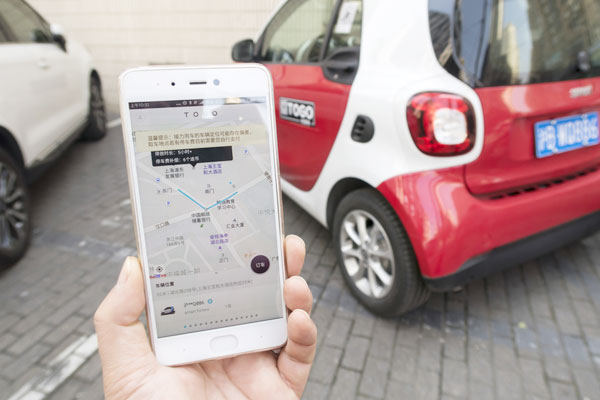China's booming car-sharing market may face more regulations
 |
|
One of the Benz Smart cars available for rent in Shanghai. [Photo/VCG] |
Vehicle-sharing businesses in China's major cities are booming with authorities looking to ease the way for them, The Beijing News reports.
Although detailed regulations have not yet been issued by public transport authorities, some have shown an encouraging attitude to the emerging industry.
Beijing's state-owned infrastructure development enterprise, Beijing Municipal Road & Bridge Group, plans to build rental sites by transforming 40 unoccupied spaces under the 2nd and 3rd ring roads.
Head of the Beijing Lawyers Association traffic and transportation committee, Huang Haibo, said that compared with bike-sharing schemes, cars used more spaces and road resources.
"City managers should take active measures to study related issues, such as whether they need to control the market's scale, establish market access standards, define automobiles' properties and regulate security and insurance of the industry," Huang said.
Other legal experts also noted that shifting car-use rights to the individuals have placed a greater reliance on personal manners and social credibility. They suggested issuing guidance and laws covering users' behavior.
Jin Caier, director of an organization that specializes in China's transportation, energy and urbanization, said that city governors should consider how to form system integrating rail, buses, taxis, time-sharing automobiles and bicycles.
Currently, most of the sharing-cars on the market are electric-powered vehicles, which are believed to be an effective approach to reduce air pollution in some cities.
"Regulations, such as license-plate lottery and traffic restrictions based on the last digit of license plate numbers, have increased the cost to be a private car owner in Beijing," Liu Xiaoqian, an early adoptor of the car-sharing sector, said. "The service will meet my commute demands and the car that I rent looks cool."
Similar to the ongoing bike-sharing fervor kindled in many of the major cities, the car-sharing market has started to boom last year.
During this year's Valentine's Day, Gofun Chuxing, a company that provides car-sharing services in Beijing, placed a random 100 cars in the street to offer free use for singles.
Gofun was launched in February 2016 by one of the leading domestic auto leasing companies, Beijing Shouqi Group, and it has deployed 1100 cars and more than 100 offline leasing counters.
Car2go, a car-sharing service provider under automotive giant Daimler AG, was launched last April, in Southwest China's Chongqing municipality, the first city that Car2go chose to enter in the Asian market.
More than 400 Benz Smart cars were put into major urban areas in Chongqing, covering 60 square kilometers, the company said.
By now, Car2go has more than 118,000 registered members and has offered over 115,000 cars in Chongqing.
Other companies, such as LeEco Holdings' car-sharing arm -- LeShare, EVCARD, who joined hands with SAIC Motor, BYD, ZTE and United Journey, have also launched similar services in first-tier cities.

















